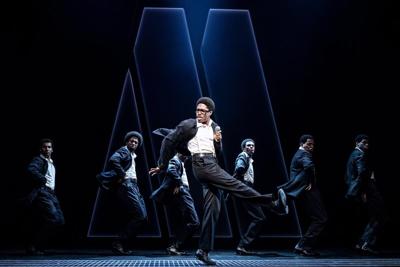AinŌĆÖt Too Proud: The Life and Times of the Temptations
3 stars
Music by the Legendary Motown Catalogue, book by Dominique Morisseau, directed by Des McAnuff, choreographed by Sergio Trujillo. Until Nov. 17 at the Princess of Wales Theatre, 300 King St. W. , 416-872-1212 and 800-461-3333.
The massive contribution of African-American artists to popular music is finally getting its due in the jukebox-musical genre. Many successful shows have been built around the back catalogue of white artists ŌĆö ABBA (Mamma Mia!), Frankie Valli and the Four Seasons (Jersey Boys), Carole King (Beautiful), and Queen (We Will Rock You) ŌĆö while creators and producers have struggled to find a workable format for Black music (does the Earth, Wind, and Fire musical Hot Feet ring a bell? My point exactly).
Since 2013 things have started to shift: Motown the Musical has been on Broadway twice and recently played here in Toronto; despite a critical drubbing earlier this year, Summer: The Donna Summer Musical is still working hard for the money on Broadway; and Tina: The Musical (about Tina Turner) was well-received in the West End and is headed to Broadway.
It therefore seems only right and proper that the Temptations are getting their moment. Their four Billboard no. 1 hits ŌĆö ŌĆ£My Girl,ŌĆØ ŌĆ£I CanŌĆÖt Get Next To You,ŌĆØ ŌĆ£Just My Imagination,ŌĆØ ŌĆ£Papa Was a RollinŌĆÖ StoneŌĆØ ŌĆö and the fact that the group has continued to record and tour since its founding in the early ŌĆÖ60s, even as nearly all of its original members were fired, quit, or passed away means that thereŌĆÖs a big story to tell.
Storytelling is indeed the formal approach taken by AinŌĆÖt Too ProudŌĆÖs creative team, led by Canadian director Des McAnuff, who knows his way around a pop-music-based show, having directed Jersey Boys, The WhoŌĆÖs Tommy, and Summer.
The show is based on The Temptations, a book by the groupŌĆÖs last surviving original member Otis Williams and adapted to the stage by award-winning playwright Dominique Morisseau. Williams (played with great empathy by Derrick Baskin) narrates, peeling away from the showŌĆÖs dozens of dazzlingly staged musical numbers to talk the audience through the bandŌĆÖs formation, ascent, and navigation of success. This gives the production the feeling of a somewhat earnest documentary, and brings home the extent to which the storyŌĆÖs being told from WilliamsŌĆÖ perspective (heŌĆÖs also an executive producer of the show).
ThereŌĆÖs a lot of important history underlying and framing this tale: the families of all five of the original Tempts (now known as the ŌĆ£Classic 5ŌĆØ) were part of the great migration of African-Americans from the countryŌĆÖs segregationist South to greater opportunity in Motor City. The Tempts pieced themselves together from smaller Detroit vocal groups, became part of the Motown hit factory, and ŌĆö as the civil-rights movement grew in strength ŌĆö chafed against and eventually overrode MotownŌĆÖs dictum that they needed to keep their work apolitical to maintain success with white listeners.
Onto all this is layered the singersŌĆÖ personal lives and relationships, a great deal of content that quickly starts to feel like a whistle-stop tour through struggle and strife. The group is barely formed before egos flare and members start to act out. There are constant battles with alcohol, drugs, and illness. WilliamsŌĆÖ relationship with Josephine (Rashidra Scott) goes from flirtation to baby to breakup in the span of a couple of minutes ŌĆö and the show could do with lingering longer on ScottŌĆÖs blistering rendition of ŌĆ£If You DonŌĆÖt Know Me by NowŌĆØ because she sings and acts the moment brilliantly (prompting a spontaneous ovation on opening night), and itŌĆÖs just about the only passage that honours a womanŌĆÖs viewpoint.
What holds this all together is the music itself: in Kenny SeymourŌĆÖs arrangements, the songs segue one to the next in thrilling ŌĆö if sometimes relentless ŌĆö waves of rhythm and tune. His 15-piece band sounds fantastic and, like the actors, does marathon work delivering the score pretty much non-stop through a two-and-a-half-hour show.
McAnuff, working with Jersey Boys choreographer Sergio Trujillo and a revolving stage designed by Robert Brill, keeps the action flowing elegantly. Slide in a desk-and-chair unit and weŌĆÖre in Berry GordyŌĆÖs office; swing the stage around and weŌĆÖre witness to an Ed Sullivan recording featuring not only the Classic 5 Tempts but the Supremes (Candice Marie Woods, Nasia Thomas, and Taylor Symone Jackson, looking stunning in Paul TazewellŌĆÖs sequined gowns, though somewhat hard to hear above the orchestrations).
In terms of technology this is not a particularly state-of-the-art staging, perhaps because of the desire to evoke the period in which most of the action takes place. Peter NigriniŌĆÖs projections of historical photos hustle the action along, and the relentless projection of place names communicates an anxiety that the audience may not be able to keep up with events (as if the context, casual summer clothes, and smoking barbecue canŌĆÖt communicate ŌĆ£Motown summer picnicŌĆØ by themselves).
The talents of the performers (Baskin, James Harkness, Jawan M. Jackson, Jeremy Pope, Ephraim Sykes, and Jarvis B. Manning, Jr., to name those playing the first six members of the group) are breathtaking. They hit all the harmonies, act with passion and credibility, and deliver TrujilloŌĆÖs ingenious choreography, which builds on the smooth arm-snaps, spins, and sexy hip grinds the Tempts were known for, while increasing their scope and complexity (musical-theatre-ifying them, if you will).
After runs in Berkeley, Washington, L.A. and now Toronto, AinŌĆÖt Too Proud is heading to Broadway next spring. ItŌĆÖs not the most innovative musical around, but itŌĆÖs opening up audiences to the great contribution of the Temptations to American music ŌĆö surely and justly a source of pride to its creators.



























To join the conversation set a first and last name in your user profile.
Sign in or register for free to join the Conversation